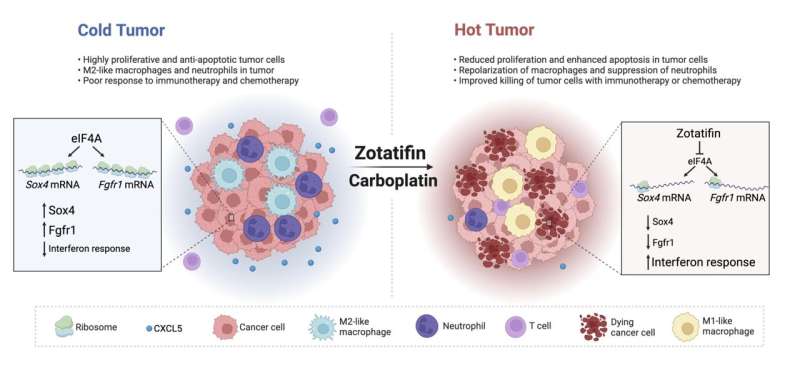This article has been reviewed according to Science X's editorial process and policies. Editors have highlighted the following attributes while ensuring the content's credibility:
fact-checked
peer-reviewed publication
trusted source
proofread
Protein eIF4A emerges as a potential Achilles' heel for triple-negative breast cancer

Improving treatments for triple-negative breast cancer (TNBC), an aggressive tumor with very poor prognosis and limited therapeutic targets, has been challenging. Responding to this need for better treatments, researchers at Baylor College of Medicine and collaborating institutions have investigated potential vulnerabilities in TNBC that could lead to novel therapies and improved outcomes for this devastating condition.
The team reports in The Journal of Clinical Investigation that in diverse TNBC animal models, targeting protein eIF4A with the small molecule drug Zotatifin not only suppresses tumor cell proliferation by robustly inhibiting the production of several tumor-promoting proteins, but also remodels the tumor immune microenvironment into one that favors tumor elimination. The promising findings support pursuing clinical trials to assess the potential patient benefits of this approach.
"Our strategy has been to control cancer growth by interfering with the production of proteins that promote its progression," said first author Dr. Na Zhao, instructor of molecular and cellular Biology in Dr. Jeffrey Rosen's lab at Baylor.
"The protein eIF4A is important for TNBC because it promotes the production of other proteins that help it grow. In this study we investigated whether inhibiting eIF4A with Zotatifin, a drug that inhibits proteins that, like elF4A, regulate protein synthesis, would reduce or eliminate the ability of eIF4A to promote cancer growth."
The results are encouraging. Treatment with Zotatifin not only reduced tumor size in animal models, but also stimulated an interferon response, which improved the immune microenvironment of the tumor.
"Zotatifin is currently undergoing a Phase I/II clinical trial in estrogen receptor-positive breast cancers. We observed the induction of a similar interferon response following Zotatifin treatment in patient biopsies from this trial in which, unfortunately, TNBC patients are not enrolled," Zhao said.
The group also tested the effect of Zotatifin in combination with chemotherapy and immunotherapy. "We observed increased DNA damage and cell death after three days of a combination treatment with Zotatifin and chemotherapy drug carboplatin," Zhao said. "In addition, we found that the combination treatment also modified the composition of immune cells within the tumor mass, recruiting more tumor-fighting cells than tumor-protecting cells."
"This is important for effective tumor elimination," said Rosen, Distinguished Service Professor of molecular and cellular biology and member of the Dan L Duncan Comprehensive Cancer Center at Baylor. He also is the corresponding author of the work.
"TNBC tumors are typically 'cold tumors,' meaning they have more immune cells that protect the tumor than cells that fight the tumor. This in turn makes immunotherapies ineffective in most TNBC as these therapies depend on having immune cells that would attack the tumor. Zotatifin changed cold tumors into 'hot tumors' carrying more cancer-fighting immune cells. This change sensitized the tumors to a type of immunotherapy called immune checkpoint blockade and improved the treatment."
Combining Zotatifin with chemotherapy drug carboplatin, which is typically used as standard treatment for TNBC, produced significantly better results than each treatment alone, as the combination markedly prolonged survival in the animal models. "I have been working with these animal models for many years," Zhao said. "Seeing that a combination treatment significantly improves survival is very exciting."
"Another positive outcome of the small molecule is that it allows for lowering the dose of chemotherapy," Rosen said. "Currently, patients are treated with a maximum tolerated dose of chemo, which carries many toxicities and negative side effects."
"But when we combine chemo with the small inhibitor, we can lower chemo to half the dose, which is the minimum effective dose, and achieve good survival benefits and reduce the toxicity. Patients are very excited about the aspect of reducing chemo, because it would decrease the negative side effects they have all experienced."
"It's encouraging and exciting seeing that this approach to cancer treatment, targeting the process for synthesizing proteins the cancer needs to grow, is producing promising results," Zhao said. "We are hoping that our studies could help inform future clinical trials and positively impact the treatment of TNBC patients."
More information: Na Zhao et al, Targeting EIF4A triggers an interferon response to synergize with chemotherapy and suppress triple-negative breast cancer, Journal of Clinical Investigation (2023). DOI: 10.1172/JCI172503



















